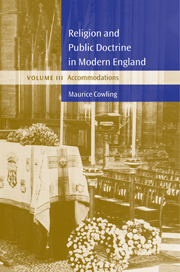Book contents
- Frontmatter
- Contents
- Foreword and acknowledgements
- Introduction
- I The Christian intellect and modern thought in modern England
- 1 The reanimation of Protestantism I
- 2 Christianity and literature I
- 3 The reanimation of Protestantism II
- 4 The enlargement of Christianity
- 5 Christianity and literature II
- 6 Christianity and modern knowledge I
- 7 Whiggism, Liberalism and Christianity I
- 8 Whiggism, Liberalism and Christianity II
- 9 Christianity and modern knowledge II
- 10 Christianity in an unfriendly world I
- 11 Christianity in an unfriendly world II
- 12 Christianity in an unfriendly world III
- 13 Christianity in an unfriendly world IV
- 14 Christianity in an unfriendly world V
- II The post-Christian consensus
- III Conclusion: religion and public doctrine in modern England
- Notes
- Index of proper names
6 - Christianity and modern knowledge I
Published online by Cambridge University Press: 23 December 2009
- Frontmatter
- Contents
- Foreword and acknowledgements
- Introduction
- I The Christian intellect and modern thought in modern England
- 1 The reanimation of Protestantism I
- 2 Christianity and literature I
- 3 The reanimation of Protestantism II
- 4 The enlargement of Christianity
- 5 Christianity and literature II
- 6 Christianity and modern knowledge I
- 7 Whiggism, Liberalism and Christianity I
- 8 Whiggism, Liberalism and Christianity II
- 9 Christianity and modern knowledge II
- 10 Christianity in an unfriendly world I
- 11 Christianity in an unfriendly world II
- 12 Christianity in an unfriendly world III
- 13 Christianity in an unfriendly world IV
- 14 Christianity in an unfriendly world V
- II The post-Christian consensus
- III Conclusion: religion and public doctrine in modern England
- Notes
- Index of proper names
Summary
As in its first dawn, Christianity … is beginning to show itself … as a principle … which … is immanent in nature and in man and … is working … to still higher issues … The principle of Christianity has come to self-consciousness, and … is … capable of being held without that mixture of illusion which was inevitable in an earlier age.
(Edward Caird, The Evolution of Religion, Vol. II, 1893, 1899 edn, pp. 315–18)In the conscientious citizen of modern Christendom reason without and reason within … combine to yield both the judgment, and obedience to the judgment … that every human person has an absolute value … that in the estimate of that well-being which forms the true good everyone is to count for one and no one for more than one.
(ed. A. C. Bradley, T. H. Green, Prolegomena to Ethics, 1883, 1890 edn, p. 231)Religion is indestructible. … What then, can we in England do for Religion? All that in us lies to secure a form of Christianity in harmony with progress, liberty, and knowledge. How can this be obtained? By making the Church of England a church of intellectual freedom and a church of the people … Can this church of an episcopal sect, this last obstinate remnant of a dead social system … become a church of freedom, a church for the people? Yes it can! It is for the people to decide.
(Arnold Toynbee, Leaflets for Working Men No. 1, in Eighteen Lectures on the Industrial Revolution in England, 1884, p. xxvi)- Type
- Chapter
- Information
- Religion and Public Doctrine in Modern England , pp. 130 - 150Publisher: Cambridge University PressPrint publication year: 2001



